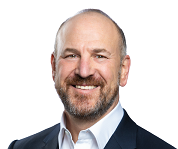Alternative asset manager Blue Owl Capital has its roots in Owl Rock, founded in 2016. The firm was born at the intersection of two trends: demand for business borrowing as banks pulled back, and appetite from investors for yield product in a low interest rate environment.
In 2021, Owl Rock merged with Dyal Capital. The business combination was completed in May 2021 at which time Blue Owl commenced trading under the ticker "OWL" on the NYSE. It has been a leader in the growth of its class, with over $165bn in assets under management today.
The firm’s largest platform by AUM is direct lending, but it also has a private equity stakes platform, as well as a real estate platform.
Diversification strategy fuels growth
Co-President Craig Packer expects Blue Owl’s growth to continue. He believes there is much more expansion to come from private wealth channels, in particular, which are in the very early stages of seeking out the non-correlated returns of alternative assets.
Blue Owl’s response is to raise more funds, and to expand into adjacent sectors. It has three products dedicated solely to software lending, for example.
Blue Owl is now diversifying to support founder-owned companies as well as those backed by private equity. It is also looking to move into what Packer calls ‘alternative credit’: investments that are not sponsor-backed LBOs, operating in areas such as asset-based lending, life insurance, drug royalties, and music royalties.
“These are all sectors that we’re in already in a small way, but we think there’s going to be growing interest from our clients to get into these niche strategies,” he says.
Portfolio origination favors organic approach
The surge in the alternative sector has created M&A opportunities for large asset managers such as Blackrock and T. Rowe Price.
Packer sees any future consolidation continuing in this way, rather than through players deciding to merge. “The consolidation primarily is going to come from the larger firms that have the scale to be successful getting bigger in an asset class that’s growing, and the smaller players maybe having a bit of a challenge there.”
Blue Owl’s own approach to growth will remain an organic one: “We’re really picky about our portfolio, and so we have a bias towards wanting to originate the assets ourselves.”
‘We’re really picky about our portfolio, so we have a bias towards originating the assets ourselves’
Craig Packer, Co-President, Blue Owl Capital
Going public for the right reasons can pay off
The Blue Owl IPO was one of the most successful of 2021. Yet taking the company public was not part of the founders’ original vision.
The IPO came about through the opportunity to merge with Dyal, says Packer. It was a means of delivering value to Dyal’s owner, Neuberger Berman, while doubling the firm’s size and creating new growth opportunities, such as the 2022 acquisition of real estate business Oak Street.
“We already had outside investors, and I’d like to think we operated with a lot of the tenets of being a public company,” he says. “So going public in and of itself didn’t transform us, and we’ve really worked hard to keep the culture the same.
“The visibility of being a public company puts an additional spotlight on your performance. But going public for the right reasons can make a ton of sense. In our case, it was a really important catalyst for that next stage of growth.”
‘We already had outside investors – going public in and of itself didn’t transform us’
Craig Packer, Co-President, Blue Owl Capital
Constant innovation drives expansion
Having enjoyed rapid growth, Blue Owl is taking the opportunity to invest in its infrastructure and systems. It recently hired a chief technology officer. Packer’s first request to him was to build an app that would replace Excel spreadsheets with simple, round-the-clock phone access to all portfolio data.
Blue Owl is also investing in global expansion, building out its teams in Asia, Europe and the Middle East, and tweaking its products to meet the needs of investors there.
An innovator from the outset, Blue Owl is looking to maintain its position by expanding its product set, Packer concludes. “We’re not perfect,” he says, “but we’re constantly challenging ourselves to make sure we’re not being complacent and think about where the market is going.”
Featured Guest:

Craig Packer
Co-President, Blue Owl Capital